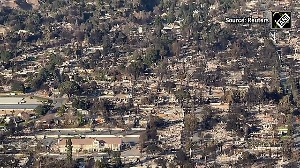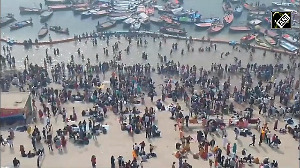Since 1993, Mumbai has been subjected to several blasts and terror attacks. During the shocking 26/11 terror attack, the Mumbai police was caught napping and hundreds were killed before the police could even spring into action.
Stung by the criticism from all quarters to their lackadaisical reaction to 26/11, Mumbai police reacted with alacrity to the serial blasts that hit southern Mumbai on July 13 last year.
In the three blasts that rocked Dadar, Opera House and Zaveri Bazaar, 26 people were killed. But the toll would have been higher if not for the timely help provided by the policemen and public that day.
Dadar blast: Recounting the events of that day, Police Inspector Shirish Gaekwad of the Shivaji Park police station told rediff.com, "It was past 6 pm and we were patrolling the streets. We were just half a kilometre away when the blast happened (in Dadar). There was a call from the police control room and we arrived at the site almost immediately".
"We saw smashed cars and a broken bike. The entire roof of a bus stop had been destroyed; the bomb had obviously been kept there. Most of the shrapnel was embedded in the nearby trees. Because the bomb was kept at a height, the impact of the blast was comparatively lesser; the damage and casualties were less. If the bomb had been placed in a bike or a car or even on the ground, the toll would have been much more. Thirteen people were injured in the blast. Private vehicles helped us rush the injured victims to the hospital.
"One of the injured died six days later in hospital. He had splinters in his head and that killed him.
"The first thing we did was cordon off the area. We had to preserve the evidence. It was raining heavily. Personnel from the bomb squad, the anti-terrorism squad and finally the National Investigative Agency reached the spot. We gathered the residue from the site after they had photographed it, videographed it and also examined the surroundings.
We then prepared the panchnama which describes the scene of the crime in detail. Heavy rains cannot destroy the evidence of a bomb blast as the residue is heavy. We filed a FIR at the police station. Five days later, the case was transferred to the ATS".
Opera House blast: Alerted by the control room, a patrol car had reached Opera House soon after the blast. Because it is a very crowded area, 15 people were killed and 70 injured in the blast. The policemen took the injured victims to the hospital.
"That place is so crowded; I thank God that the casualties were less. Thousands could have been killed," said Gaekwad.
During emergency situations, the police control room takes over the charge of the situation. The policemen manning the control room alert the nearest police stations and soon inform the entire police force. This is followed by calls to ambulance services, the fire brigade and nearby hospitals. Finally, they inform blood banks, senior officials and the home ministry.
The inspector recalled, "The local people were very cooperative and the hospital staff were amazing; they were helpful and absolutely calm".
Zaveri Bazaar blast: Sub-Inspector Pandurang J Sanas, a much-awarded policeman, said, "These traders carry their diamonds in their pockets and some have it in their waist bands, so we spread plastic sheets all over the blast site. We did not want the diamonds to get washed away in the rains. It was pouring at that time.
"Then we put up halogen lights as we did not want anyone sneaking in to look for diamonds. We had cordoned off the area till the bomb squad, ATS and NIA arrived.
"We had sent teams of policemen led by an inspector to all the neighbouring hospitals to help the injured in whatever way they desired. Some need you to call their homes, others need blood. Some want you to take care of their valuables like rings, chains, cash and phones. The policemen made sure that no one disturbed the doctors. People tend to get emotional in such times and they sometimes end up fighting with the hospital staff.
Then we had to shift the dead bodies to the morgue, collect post mortem reports and also arrange for the bodies to be handed over to the next of kin. Some people needed ambulances to transport dead bodies and others wanted the injured to come home with them. We helped each one of them".
As the custodians of one of the world's most bustling metropolises, the Mumbai police lived up to the challenges of that horrific day and proved their mettle.











 © 2025
© 2025